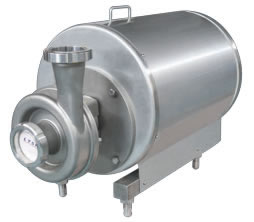Hygiene in beer, dairy & soft drinks production is an absolute necessity and hygienic centrifugal pumps are the main prime mover in these industries.
Hygienic construction is not just about using stainless steel – in 27 years offering solutions for manufacturers in these sectors, we have heard this so many times. A hygienic pump needs to be of stainless construction, but it also needs to have mechanical seals & O-rings that are both food grade and easy to clean. The pump needs to be constructed such that a CIP (clean-in-place) flow can get to all surfaces.
Many small brewers use industrial stainless pumps, which while offering a lower initial cost and in some cases better efficiencies often prove to be more costly in the longer term. Why is this?
An industrial pump can be built with close internal tolerances that increase efficiency (impeller hubs, shaft sealing areas, closed spot welded fabricated impellers), but this makes it harder to clean effectively. For hygiene, shaft seals need to be in the main product flow, not set back out of the way where they cannot be effectively cleaned. Casing seals need to be in the product flow, not set back in a groove that can harbour bacteria. Impellers need large, open flow paths to avoid blockages with hop seeds/leaves.
In order to help brewers overcome the barriers of high initial cost vs long term benefits associated with the use of a true hygienic pump, HpE Process have recently launched the Versaline VCP pump range that offers much lower installed costs than any competitive product, but without the sacrifice of lower hygiene.
The VCP pump is not just limited to brewery use – dairy processing has its own set of pumping problems to overcome and we at HpE have the skills and experience to select pumps for long term benefit. Dairies must have a cleanable pump and the VCP is a true hygienic pump – its construction allowing all areas including the mechanical seal housing to be fully flushed during CIP.
Dairy products are shear sensitive, the idea of running it through a pump with an impeller running at 3000 rpm seems unusual and certain to damage the cream content.
However, a correctly designed and selected centrifugal pump will allow high flowrates with less shear than many rotary lobe pumps. It is all down to selection and comparing dwell time in the pump to impeller speed. As a rule of thumb: – Low flow / high pressure = more shear
It also means lower efficiencies as much of the energy used by the pump to overcome discharge pressure is wasted in pipe friction losses. We can offer the customer a range of solutions for a given application, with calculations of energy costs based on different pipe sizes in a system.
For example – A customer wishes to increase the flow through their existing 1.5” pipe system. This also requires a higher pressure. Yes, we can offer a pump for just that, but we will also calculate what the long term running costs would be and compare those to the lower energy costs of using their existing pump but up-grading the pipework to 2”.
In a market sector that is under considerable cost pressure from supermarkets, the Versaline VCP pump and the expertise at HpE provide a very cost effective solution to the transfer of Dairy products.

